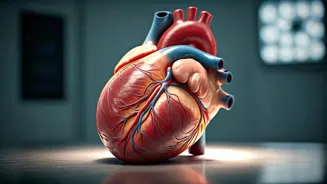Sodium's Heart Impact
Cardiologists often underscore the critical connection between high sodium intake and the health of your heart. Consuming too much salt, scientifically
known as sodium chloride, is a significant risk factor for various cardiovascular diseases. Increased sodium levels in the body can lead to high blood pressure, which consequently puts a strain on the heart, making it work harder to pump blood. This persistent strain over time may damage the heart, leading to conditions such as heart failure and strokes. The good news is that understanding this relationship allows for preventative actions to keep your heart healthy. Making informed choices about your diet and limiting sodium consumption is one of the most important steps you can take to safeguard your heart's well-being.
Blood Pump & Salt
A high-sodium diet significantly impacts the heart's ability to function effectively. Sodium causes the body to retain water, which increases the volume of blood circulating through your vessels. This increased blood volume places extra pressure on the artery walls and makes the heart work harder to circulate blood, resulting in elevated blood pressure. The prolonged elevation of blood pressure is a major risk factor for damaging blood vessels, which can lead to atherosclerosis. Atherosclerosis, characterized by the buildup of plaque in the arteries, further restricts blood flow and increases the likelihood of heart attacks or strokes. Therefore, keeping sodium intake in check is vital for sustaining the normal functioning of your blood pump, helping the heart to beat steadily and efficiently.
Reversing the Damage
While high sodium intake can cause cardiovascular damage, there are measures that can be taken to potentially reverse or mitigate some of the harmful effects. One of the most effective strategies is adopting a heart-healthy diet that is low in sodium. This involves consciously choosing foods that are naturally low in sodium, such as fresh fruits, vegetables, and lean proteins. Secondly, maintaining regular exercise is paramount, since physical activity can help lower blood pressure and improve overall cardiovascular health. Moreover, consulting a healthcare professional for guidance on managing blood pressure and monitoring heart health is a wise step. They might recommend certain medications or lifestyle adjustments based on your individual needs. Consistently following these methods can help reduce the strain on the heart, and promote its health.












